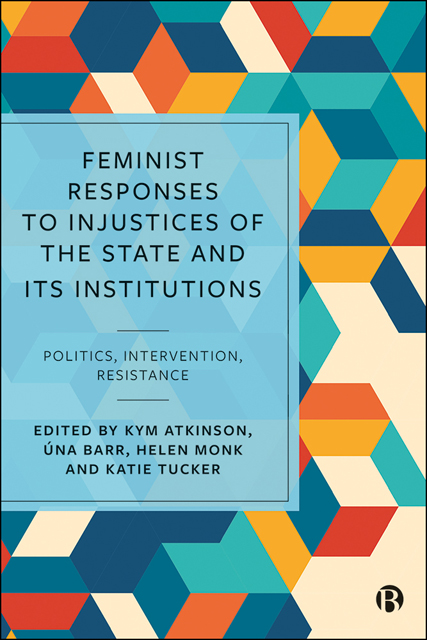 Feminist Responses to Injustices of the State and Its Institutions
Feminist Responses to Injustices of the State and Its Institutions 3 - State (In)action and Feminist Resistance to the Denial of Abortion Rights in Northern Ireland
Published online by Cambridge University Press: 17 June 2023
Summary
Introduction
The island of Ireland has become a focus for the study of state (in)action across its two legal jurisdictions in recent years. This is owing to the significant constitutional change both in the Republic of Ireland, governed by Rialtas na hÉireann, and in Northern Ireland governed by Stormont’s Northern Ireland Executive and its Legislative Assembly, and by Westminster. These jurisdictions were created in 1921 after the British state partitioned the island. While the struggle for reproductive justice has been ongoing for decades, there has often been little attention paid to this outside of Ireland. State inaction on the island is the result of the historically conservative nature of its institutions discussed later in the chapter, while other European countries had been much quicker to modernize. Despite being a part of the United Kingdom, Northern Ireland’s exceptional status within this context has further contributed to the retention of antiquated law that in the other regions had been significantly changed by the Abortion Act of 1967.
The conservative approach to bodily autonomy is exemplified by the specific provisions relating to abortion in the Offences Against the Person Act (1861), which was passed by the Imperial British Parliament and remained in force for over 140 years. So although there are two different states on the island of Ireland, feminist responses found common cause because they opposed the shared foundation of legal principles found in that surviving legislation, namely that abortion is criminally unlawful and punishable by incarceration. Sections 58 and 59 of the Offences Against the Person Act (1861), remained the basis of the law in the Republic of Ireland until 2018 and remained the law in Northern Ireland until 2019 and stated the following:
58. Every woman, being with child, who, with intent to procure her own miscarriage, shall unlawfully administer to herself any poison or other noxious thing, or shall unlawfully use any instrument or other means whatsoever with the like intent, and whosoever, with intent to procure the miscarriage of any woman, whether she be or be not with child, shall unlawfully administer to her or cause to be taken by her any poison or other noxious thing, or shall unlawfully use any instrument or other means whatsoever with the like intent, shall be guilty of felony, and being convicted thereof shall be liable … to be kept in penal servitude for life.
- Type
- Chapter
- Information
- Feminist Responses to Injustices of the State and Its InstitutionsPolitics, Intervention, Resistance, pp. 55 - 75Publisher: Bristol University PressPrint publication year: 2022


